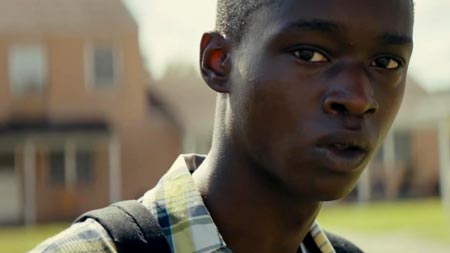Film (2016)
Written and directed by Barry Jenkins
Based on a story by Tarell Alvin McCraney
With Mahershala Ali (Juan), Alex Hibbert (Little), Ashton Sanders (Chiron), Janelle Monáe (Teresa), Naomie Harris (Paula)
Jaden Piner (Kevin, 9), Trevante Rhodes (Black), Jharrel Jerome (Kevin, 16), André Holland (Kevin)

Photo: A24 Films
Chiron, who, as a young boy (Alex Hibbert), is called Little, gets teased and brutalized mercilessly for being soft. His mother, Paula (Naomie Harris), is a drug-addict and a prostitute and Little finds some companionship and support with friends Juan (Mahershala Ali) and Teresa (Janelle Monáe). As well, his friend, Kevin (Jaden Piner), offers companionship and support.
As Chiron becomes an older teenager (Ashton Sanders), he begins to explore his sexuality a bit more, and, after some significant brutal encounters, even involving a friend, he begins to take self-defense into his own hands. Finally, in adulthood, as Black (Trevante Rhodes), he emerges into a position of some authority, but is still vulnerable within and searching deeply for something he misses.
This very touching but somewhat episodic film conveys the pain and anguish of its protagonist’s life effectively while avoiding elements of the narrative that might have been useful for fleshing out further dimensions of background, history and character. Nonetheless, despite these gaps and leaving many questions unanswered, writer-director Barry Jenkins manages to get the important stuff across.
The big question is about how Chiron’s sexuality translates across the years the film traverses. The story is most cogent in its first two sections, leaving those big open questions in its third section. What happens to Chiron during the time between sections two and three isn’t particularly clear; remarkably, it may not need to be for the film to provide much of its impact. Nevertheless, as a result of those narrative gaps, the film remains more of a suggestive and moving inquiry rather than a more comprehensive and probing account of the life of a young black homosexual.
There are other gaps that leave significant questions unanswered. What ever happens to Juan, who befriends Little when he discovers him hiding in an abandoned building, or to Teresa, Juan’s partner, who plays a big role in Chiron’s life as well? We see a lot of Juan in the beginning and then he just disappears. Again, in the sway of the film, one is inclined to just scratch that up to narrative choice, but it seems odd to leave it hanging.
And, in the end, when Chiron (now called Black) seeks out his old friend Kevin, it’s not entirely clear what, out of the blue, motivates him, or what Kevin is about at this point. The scene provides a window into their lives, a hunch of what will happen, and a vivid sense of the pain that Chiron, in particular, has suffered and which he seeks to heal.
The success of the film derives from its capacity to convey that painful solitude effectively without telling an entire story. This story it does tell is a compelling depiction of proto-homosexuality among African-American boys, deriving much of its power from the sense of particularly forbidden sexuality within that context. The combination of traumatic isolation and social ostracism among peers enables Jenkins’ patchwork of narratives to fuse into an affecting whole.
Alex Hibbert is amazing as Little and Ashton Sanders equally so as the teenage Chiron. Naomie Harris, as Chiron’s mother is wrenching. It is great to see fine actors like Mahershala Ali and Janelle Monáe as the supportive in loco parentis adults here; they also shine in the wonderful Hidden Figures.
– BADMan
Leave a Reply